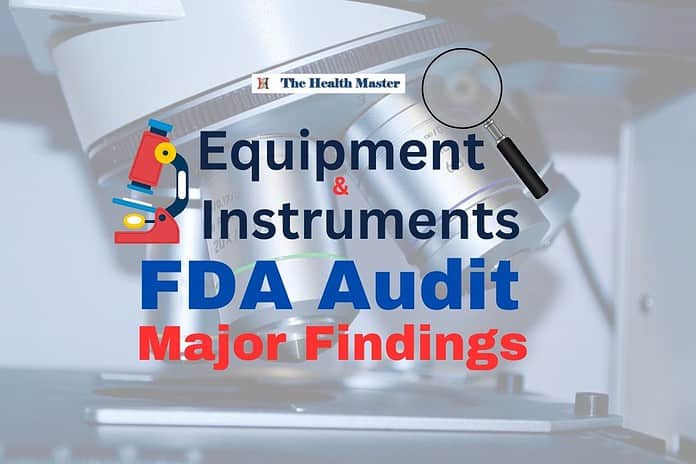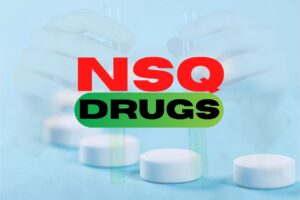- Key Notes on Revised Schedule M: Plant and equipment - August 16, 2025
- Drug Imports: New Online System for Dual Use NOC launched - August 2, 2025
- Amendment: Know About the Cosmetics (Amendment) Rules, 2025 - July 31, 2025
Last Updated on January 5, 2025 by The Health Master
FDA audit findings in Pharma Industry
The pharmaceutical industry is extremely regulated industry for ensuring the manufacturing the high quality drugs and medical devices with maintaining the safety and efficacy of such drugs and medical devices.
Regular FDA audit findings play a very important role in maintaining the mandatory standards because these findings help to identify the scope of improvement and also ensure the compliance by the facilities according to the necessary required regulations.
As part of the regulatory workings , the Food and Drug Administration (FDA) regularly conducts audits and inspections of the pharmaceutical facilities with respect to the manufacturing process and practices adopted by the pharma facilities.
One most important and critical aspect of these types of audits and inspections done by FDA, is to check the evaluation of equipment and instruments used in the manufacturing and testing of the drugs.
In this article, we will delve into few major FDA audit findings with respect to the equipment and instruments commonly used in the manufacturing of drugs in the pharma industry.
Major FDA Audit Findings
Calibration of the equipment & instruments:
- The FDA minutely examines the issue whether all the equipment and instruments used in the drug manufacturing process are regularly and properly calibrated.
- Regularly calibration of the equipment and instrument ensure that they working properly and their results of measurements are accurate and consistent. This is very important and a very crucial part for manufacturing a high quality.
- These FDA Audit findings often comes with the instances of outdated or improper calibration process which may lead to major inaccuracies in performing the various test with respect to quality of the product.
Inadequate Maintenance:
- These equipment and instruments must be regularly maintained for their optimal functioning so that they can give accurate results.
- Improper maintenance of the equipment and instruments may compromise the integrity of the manufacturing process and ultimately the product quality during the manufacturing process.
- These FDA audits also identify any instance where schedules for maintaining are not followed, sometime it is observed that spare parts are not available or maintenance records are found incomplete or inaccurate or not up to the mark.
Data Integrity:
- The FDA audits also identify the issues related to the data integrity in the pharmaceutical industry.
- Sometimes the FDA audit finds the data integrity breaches like data manipulation, unauthorized access or not having proper data backups.
- The Data integrity issues raise many critical concerns regarding the reliability of data of the quality control which is very important to verify the safety and efficacy of drugs.
Training of technical staff:
- Properly trained personnel are very important part for operating equipment and instruments accurately and safely in the pharma facility.
- The FDA emphasize on the comprehensive training programs and also evaluates the competence of technical staff during the audits.
- FDA audit findings frequently highlight cases of improper, insufficient or irregular training, which may lead to misuse of the equipment and instruments and sometimes inaccurate test results which can compromise the quality of the product.
Cleaning and Sanitization:
- Proper, timely and regular cleaning and sanitization of equipment and instruments used in the manufacturing process, are very important and essential part for preventing cross-contamination and ensure safety of the product.
- These FDA audits frequently finds deficiencies in cleaning process sometimes lack of validation for cleaning processes or inadequate training of the technical staff on cleaning protocols in the pharma facility.
Addressing Audit Findings
To address the findings during FDA audit with respect to equipment and instruments, pharmaceutical facility may practice as under:
Calibration Programs:
- The pharma company may develop and implement calibration process for all the critical equipment and instruments used in the facility.
- Regular and frequent review procedure may be adopted for the calibration schedules to ensure accuracy and efficacy of the instruments.
- Maintenance of the detailed records with respect to the calibration activities and results.
- Conduct regular internal audits and inspections for verification of the effectiveness of the such calibration program.
Emphasize Preventive Maintenance:
- Develop a maintenance plan with respect to the outlining specific tasks and frequencies for all equipment and instruments, .
- Maintenance activities must be performed by trained, qualified personnel.
- Maintenance of the centralized record for all maintenance activities and spare parts inventory.
- Implementation of all conditions for monitoring and predictive maintenance techniques where feasible.
Data Integrity Controls:
- Development of a robust data management systems with audit trails and access controls.
- Implementation of regular training to technical staff with respect to the data integrity policies and procedures.
- perform regular and periodic audits for identifying and rectifying the data integrity issues.
- Implementation a habit of data integrity and ethical behavior for the technical persons in the pharma facility.
Employee Training:
- Development and implementation a comprehensive training programs for all the technical persons and other employees using the equipment and instruments.
- Provide training to keep staff updated and enhance the knowledge with respect to the latest equipment, instruments and pharma industry trends.
- Maintain the effectiveness of training program by means of competency evaluations and assessments of knowledge of the staff.
Cleaning and Sanitization Procedures:
- Develop proper procedure for the cleaning and sanitization procedures for all equipment and instruments and the same should be validated.
- Training must be given to the staff on proper cleaning techniques and procedures. They must be also trained for the importance of adherence to protocols.
- Regular monitoring and validataion of the effectiveness of cleaning procedures.
- Develop and implement a robust system to track and document all the cleaning activities.
Conclusion
These FDA audit findings related to equipment and instruments in the pharmaceutical industry are important and critical parts for compliance and maintaining the product quality during manufacturing process.
By addressing the following common issues, pharmaceutical companies can enhance their operations, ensure regulatory compliance, and maintain the highest standards of product quality and safety:
- Calibration problems,
- Inadequate maintenance,
- Data integrity breaches,
- Lack of training,
- Subpar cleaning practices.
Proactive measures and continuous improvement efforts are essential to excel in the competitive and highly regulated pharmaceutical landscape.
Compiled by:
Rakesh Dahiya, ASDC, FDA Haryana
Equipment and Instruments: Maintenance, difference and importance in the Pharma Industry
Quality Assurance in the Pharmaceutical Industry
Upcoming events: Pharma, Cosmetics, Homoeopathy & Medical Devices
Cosmetics Testing in India: A Comprehensive Guide
Difference between Validation and Calibration in the Pharma Industry
Calibration of Laboratory Instruments
Difference: Disintegration and Dissolution test in pharma industry
Understanding DQ, IQ, PQ, and OQ in the Pharma Industry
Duties and responsibilities of QA person in Pharma Industry
Dissolution test: Importance in Pharma Industry
NSQ Drug: Route cause analysis and CAPABA / BE Studies: Bioavailability & Bioequivalence
Key Notes on Revised Schedule M: Compilation
Important short notes for Industry and Regulators
CDSCO Guidelines on Drug Recall
Quality Assurance Vs Quality Control in the Pharma Industry
Major FDA audit findings about Equipment and Instruments
Understanding GMP, cGMP, and WHO-GMP
Quality Assurance in the Pharmaceutical Industry
Duties and responsibilities of QA person in Pharma Industry
Difference: Disintegration and Dissolution test in pharma industry
Understanding DQ, IQ, PQ, and OQ in the Pharma Industry
Procedure to obtain License to Manufacture drugs for testing and analysis purposes
Procedure to obtain license for Commercial Testing Laboratories
Latest Notifications: Testing Laboratories
Commercial Testing Laboratories
Commercial Testing Laboratories: Procedure
Updated list of Medical Device Testing Laboratories (MDTLs)
List of Laboratory Instruments for Pharma & Cosmetics Industry









